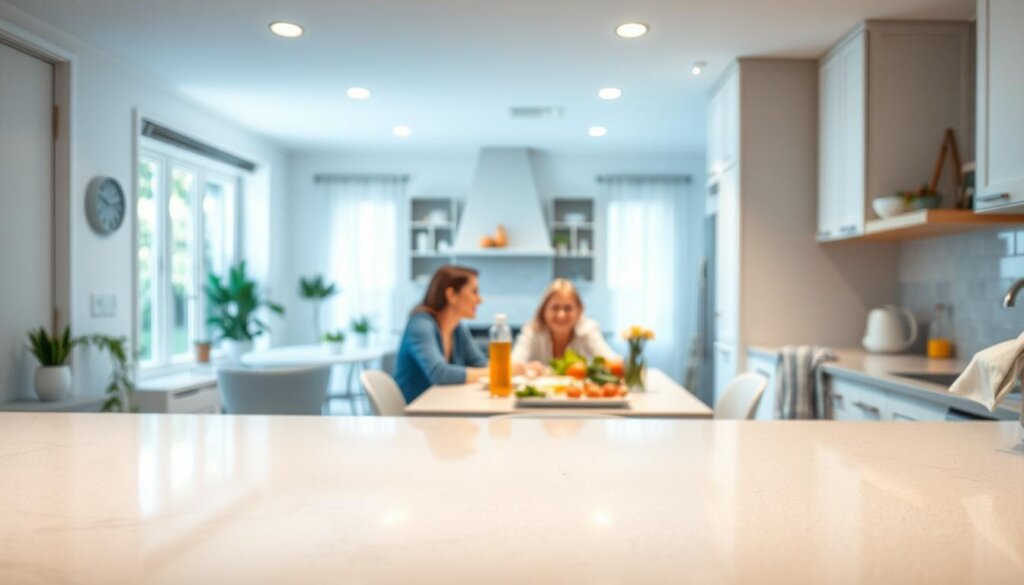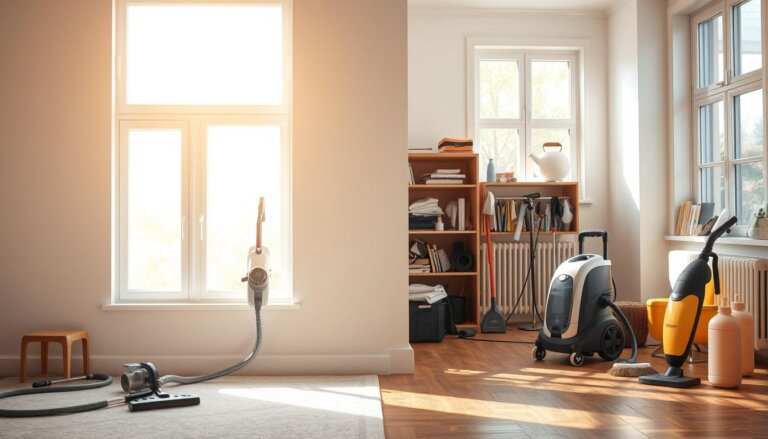Regular Cleaning vs. Deep Cleaning: Key Differences
A study shocked many by finding about 340 different bacteria types in each square inch of a household. This fact highlights why both regular and deep cleaning are key to keeping not just a clean look but a truly germ-free environment. Knowing what is the difference between a regular cleaning and a deep cleaning greatly affects health and happiness at home. Regular and deep cleaning offer two totally different ways to achieve this, each critical in making living spaces better.
Regular cleaning is what we usually do every day or week. This professional teeth cleaning routine stops dirt and bacteria from piling up, making places look nice and safe. Deep cleaning gets into the hard-to-reach spots missed in everyday cleaning, needing more work but being very important. These cleaning methods are crucial not just for looks but for staying healthy and clean.
The value of being clean is well known, but different areas need different cleaning levels. Knowing what is the difference between a regular cleaning and a deep cleaning helps you make your home the best it can be. Whether it’s a light tidy-up or a deep scrub, the effort you put in changes with your cleaning choices and needs.
Key Takeaways
- Understanding the distinction between regular cleaning and deep cleaning is essential for a healthy home environment.
- Regular cleaning is a preventive measure aimed at maintaining everyday cleanliness.
- Deep cleaning tackles hard-to-reach areas and built-up grime, going beyond the surface.
- Both cleaning types are crucial for differing circumstances and desired outcomes.
- Effective home sanitation relies on combining both regular cleaning and deep cleaning techniques.
Understanding Regular Cleaning
Regular cleaning is vital for keeping a healthy, clean space. It’s more than making things look good. It keeps us well. Practices like plaque and tartar removal in oral care help stop harmful buildup. Regular cleaning does the same for our homes.
Definition and Purpose
Clean spaces are not just nice to look at. They are also good for our health. Cleaning stops dirt and junk from gathering. It’s like how preventive dental care stops mouth problems. It also makes homes last longer and healthier.
Frequency of Service
How often we clean depends on our lifestyle and where we live. A weekly clean works well for most. But, busy places or allergy seasons need more. Like how dental office cleanings are every six months for healthy teeth.
Common Tasks Included
Many tasks go into keeping spaces looking their best. These include:
- Vacuuming carpets and rugs to get rid of dust
- Mopping floors to remove marks and stickiness
- Dusting to keep areas clean
- Cleaning glass for a clear view
- Disinfecting bathrooms and kitchens to stop germs
In cleaning, we focus on removing both seen and unseen dirt. It’s like plaque and tartar removal in dental care. It keeps our surroundings healthy and beautiful.
What is Deep Cleaning?
Deep cleaning goes beyond just wiping away dirt, it dives deep to ensure true cleanliness. It uses similar tools and products as regular cleaning but focuses more on detailing and hard-to-reach areas. Techniques like scaling and root planing for dental health show how deep cleaning targets spots that are often missed.
In medical settings, deep cleaning needs extra care. It’s crucial for preventing infections, providing a safe space for patients, and meeting health standards.
Deep cleaning isn’t just about looks; it’s crucial for health too. In work areas, it’s key before inspections or audits. For homes, it’s advised in allergy season or after someone’s been sick, to clear out allergens or germs.
Deep cleaning includes:
- Cleaning under furniture and behind appliances, and reaching high places like ceilings.
- Using steam cleaning or strong disinfectants for sanitation.
- Cleaning vents and filters to keep air clean.
- Wiping down surfaces people touch a lot, like doorknobs and switches.
This complete cleaning approach is based on dental care principles like scaling and root planing and periodontal maintenance. It gives us a good idea of what deep cleaning means in different areas.
Comparing Regular and Deep Cleaning
It’s important to know how regular and deep cleaning differ. It’s like comparing daily toothbrushing to a dentist’s deep clean. Each type targets different areas and needs various tools and time.
Scope of Work
Regular cleaning is like brushing teeth. It keeps surfaces clean with dusting, vacuuming, and mopping. Deep cleaning goes further, like a dentist’s visit. It cleans hard-to-reach spots and tackles overlooked areas.
Time Investment
Regular cleaning takes a few hours each week to keep things neat. Deep cleaning takes more time, sometimes a whole day. It’s like a detailed dental cleaning, requiring effort to remove all dirt.
Equipment and Supplies Used
Different tools are used for regular versus deep cleaning. Everyday cleaning uses simple tools like dusters and mops. Deep cleaning needs more, like powerful vacuums and special cleaners, to fully sanitize.
In short, both cleaning types are key for a healthy space. Knowing their differences helps choose the right method and tools, making areas not only clean but welcoming.
Benefits of Regular Cleaning
Regular cleaning does more than just make a space look good. It improves our living areas and makes them safer. This simple home care act has many benefits. They go deeper than just having a clean surface.
Maintains Clean Living Space
A steady cleaning schedule keeps living areas tidy and free from mess. It involves removing dust, dirt, and junk regularly. Homes become more welcoming for daily life. Think of it like dental cleaning that stops plaque and tartar. It helps in keeping oral health in check.
Enhances Indoor Air Quality
Cleaning regularly also betters the air we breathe indoors. Dusting and vacuuming get rid of pollutants in the air. This is key for people with allergies or breathing problems. Just like dental health prevents bigger health issues, cleaning cuts down allergens. This ensures the air stays fresh.
Cost-Effectiveness
Seeing regular cleaning as an investment helps in the long run. It keeps surfaces and items in good shape, avoiding the need for big cleanups. Similar to how dental care prevents expensive treatments later. Choosing regular cleaning services saves money over time. They’re more affordable than big, deep cleaning sessions. This makes maintaining a clean home less of a strain on your budget.
Advantages of Deep Cleaning
Deep cleaning your home does more than make it look good. It also brings big health benefits and helps keep your home in good shape for longer. It’s really important for areas that get dirty over time, which regular cleaning can miss. Just like periodontal maintenance is key for your teeth, deep cleaning is key for your home.
One big plus of deep cleaning is it gets rid of hidden dirt and grime. This makes your home look better and keeps it strong. Just like different dental cleaning types help with different dental issues, deep cleaning tackles specific problems. If these problems are ignored, they could harm your home in the long run.
Deep cleaning is also great for your health. It gets rid of mold, mildew, and germs in hard-to-see places. This can stop health problems caused by these nasties. It’s a lot like detailed dental cleanings that stop gum disease by removing plaque and tartar.
Regular deep cleaning keeps your home and you healthier. It’s like periodontal maintenance that stops problems before they start. Using detailed cleaning methods can cut down health risks. It makes your home and your health better for a long time.
Ideal Candidates for Regular Cleaning
Getting your place or teeth cleaned regularly is key to a clean, healthy lifestyle. It’s perfect for those who are always busy, families with kids, and people who clean often but need more help. Regular dental office cleanings are a must for anyone serious about their oral health but need experts to take care of plaque and tartar removal.
- Busy Professionals: People with full schedules might struggle to find time for cleaning or dental upkeep, making planned cleaning services ideal.
- Families with Children: Kids tend to make a mess fast; regular cleaning keeps your home germ-free, cutting down sickness risks.
- Those with Regular Cleaning Routines: Even thorough cleaners benefit from pros who can clean deeply, crucial for maintaining dental health.
| Service Type | Frequency | Primary Benefit |
|---|---|---|
| Home Cleaning | Weekly/Bi-weekly | Sustained cleanliness and order |
| Dental Cleaning | Every 6 months | Effective plaque and tartar control |
Regular cleanups are vital for a clean house or healthy gums and teeth. They help a lot if you can’t clean often by yourself because of being busy or for health reasons. Getting your teeth cleaned by professionals is key for fighting off plaque and tartar and keeping your mouth healthy.
Ideal Candidates for Deep Cleaning
Some situations really stand out when it comes to the need for deep cleaning. This kind of cleaning is super important for keeping your place not just looking good but also for staying healthy. It’s a bit like getting your teeth cleaned professionally to keep your smile bright and healthy.
New homeowners greatly benefit from a deep clean. It makes sure their new home is totally free from any leftover dirt or mess from previous owners. It completely refreshes the space, making it clean and truly their own in every way.
Allergy sufferers see a huge improvement from deep cleaning. It cuts down a lot on dust, pet dander, and pollen, which usually hide in hard-to-clean spots. Regular deep cleaning can help control allergies almost as much as getting your teeth cleaned fights off dental issues.
For those who have pets, deep cleaning is almost a must. It tackles all the pet hair, dander, and the little accidents that come with owning pets. This thorough cleaning ensures that the house stays smelling fresh and is clean, which is crucial for a healthy living environment.
- New homeowners looking to ensure their house is pristine before moving in.
- Individuals with allergies requiring a reduction in home-based allergens.
- Pet owners who need to manage excess fur, dander, and odors effectively.
In conclusion, deep cleaning is essential for many reasons. It gives new homeowners a fresh start, helps allergy sufferers live more comfortably, and keeps homes with pets clean and odor-free. It’s similar to how regular teeth cleaning prevents dental problems, deep cleaning prevents health issues by keeping living spaces clean.
Impact on Home Health
Keeping our homes clean does more than just make them look good. Like brushing and flossing keep our mouths healthy, cleaning our homes well is key to a clean and healthy living space. These cleaning steps are like dental care. They fight bacteria and stop allergens, which keeps us healthier.
Regular and deep cleaning of our homes can be as crucial for our health as oral hygiene procedures are for dental health.
When we clean regularly, we remove things like dust, pet fur, and pollen. This can really cut down on allergies. These cleaning habits also lower our chances of getting sick from germs. This is similar to how taking care of our teeth stops mouth infections.
| Cleaning Type | Health Benefit | Comparison to Dental Care |
|---|---|---|
| Regular Cleaning | Decreases dust and allergens | Similar to daily brushing |
| Deep Cleaning | Eliminates hidden bacteria and viruses | Comparable to professional dental cleaning |
In the end, cleaning our homes well makes them look nicer and keeps us healthy. Clean homes and healthy bodies go hand in hand, just like dental care helps us stay healthy. It shows why cleaning our homes well is so important.
Best Practices for Regular Cleaning
Keeping your home clean and tidy takes regular work and good planning. Just like we need regular cleaning at the dentist to keep our teeth healthy, having a smart cleaning routine is key for taking care of your home. We can learn a lot about how to clean our homes effectively by looking at how dental offices are cleaned.
Creating a Schedule
- Identify high-traffic areas that need frequent attention.
- Allocate specific days for different tasks to ensure complete coverage over the week.
- Include seasonal deep cleaning sessions to address areas that are not part of the daily or weekly routine.
Essential Cleaning Supplies
| Supply | Usage | Similar Dental Tool |
|---|---|---|
| All-purpose cleaner | Surface cleaning in kitchen and bathroom | Air-water syringe in dental office cleanings |
| Microfiber cloths | Dusting and polishing furniture | Polishing tools for teeth |
| Disinfectant | High-touch areas like doorknobs and switches | Disinfectants used in sterilizing dental instruments |
Tips for Efficiency
- Start cleaning from the top of a room and move downwards to prevent dust from settling on cleaned areas.
- Keep all your cleaning supplies in a portable caddy for easy access and mobility.
- Focusing on one task at a time can prevent feeling overwhelmed and ensures thorough completion.
Just like we need to be careful and regular with dental cleanings, keeping our homes clean requires an active plan. Using the detailed care seen in dental clinics can really help improve how we clean our homes.
Best Practices for Deep Cleaning
Deep cleaning is similar to professional teeth cleaning or scaling and root planing. It requires careful attention to spots that get really dirty. In this section, we talk about how to deeply and effectively clean your home or work area.
Focus Areas to Prioritize
When deep cleaning, it’s important to focus on certain areas. Look at high-traffic spots, spaces under big furniture, and corners in kitchens and bathrooms. Like how scaling and root planing clean under the gums, deep cleaning reaches grime regular cleaning can’t.
Tools for Effective Clean
Using the right tools is key for a good deep clean. Think of using power scrubbers, steam cleaners, and strong disinfectants. They’re like the tools dentists use in scaling and root planing. These tools help you reach a clean that’s hard to get with regular items, just like a professional teeth cleaning.
Professional vs. DIY
Deciding to hire professionals or clean yourself depends on what you need. For deep cleaning, like with professional teeth cleaning, sometimes it’s best to get experts. They bring skills and tools that can do more than what you usually have at home.
Combining Regular and Deep Cleaning
Mixing regular and deep cleaning is like combining gum care with preventive dental visits. This approach ensures everyday tidiness and deep cleanings keep a place spotless. It’s similar to dental check-ups with deep cleans for perfect oral health.
Switching from regular to deep cleaning depends on certain needs, like seasons or special events. This sees to every cleaning detail effectively. Just as dental care prevents issues before they start, regular cleaning stops dirt buildup. This makes deep cleaning easier and less frequent.
Thorough cleanliness doesn’t just make a space look good; it also boosts health and safety. Regular cleaning stops dust and allergens. Deep cleaning removes tough dirt, similar to dental care preventing diseases early.
This strict cleaning plan has many benefits. It offers peace of mind, prevents health risks, and makes a place look great. Just like thorough dental care is vital for healthy teeth, mixed cleaning methods are key for a great environment.
Cost Differences Between Regular and Deep Cleaning
Thinking about regular cleaning vs deep cleaning? It’s key to know each has different costs. Regular cleaning is less work and happens more often, so it’s cheaper. Deep cleaning takes more effort, special tools, and time, much like various oral hygiene procedures. We’ll look at what both cleaning types usually cost and what affects their prices.
| Type of Cleaning | Average Cost |
|---|---|
| Regular Cleaning | $75 – $200 per session |
| Deep Cleaning | $200 – $400 per session |
Factors Influencing Cleaning Costs
- Size of the Property: Big places take more time and resources, upping the cost.
- Level of Dirt and Buildup: More mess or long-time neglect means paying more for cleaning.
- Geographic Location: Cost varies by area, similar to the price differences in oral care.
Choosing a Cleaning Service
Looking for a cleaning service is similar to choosing a dentist. Just as there are different kinds of dental cleanings, cleaning services offer varied benefits. It’s important to know the difference between regular and deep cleaning. This helps in making the right choice, like picking a dentist good at removing plaque.
What to Look For in Regular Cleaning Services
Regular cleaning keeps your place tidy all the time. The service should offer flexible times and use safe cleaning products. Like dental cleanings prevent plaque, regular cleaning stops dirt from building up. This keeps your home fresh and clean.
What to Look For in Deep Cleaning Services
Deep cleaning goes after the tough grime and dirt, just like deep dental cleanings fight tartar. These services clean spots that are hard to reach. They use special tools for a deeper clean, keeping your home spotless.
Questions to Ask Before Hiring
- What specific tasks are included in your regular and deep cleaning packages?
- Can you provide proof of insurance and bonding?
- Do you offer any satisfaction guarantees?
- How do you train your staff, and are they subject to background checks?
| Cleaning Type | Focus | Frequency | Best Suited For |
|---|---|---|---|
| Regular Cleaning | Surface cleaning, dusting, vacuuming | Weekly/Bi-weekly | Busy households, small offices |
| Deep Cleaning | Grout cleaning, appliance deep cleaning, window washing | Quarterly/Annually | Households with pets, high-traffic environments |
This method of choosing a cleaning service fits your needs like the right dentist. These tips help you keep your place clean and healthy.
Conclusion: Which Option is Right For You?
Choosing between regular cleaning and deep cleaning depends on your lifestyle and home. The size of your home and how lively your children and pets are play a big role. You might need one type of cleaning more than the other because of these factors.
Maybe your place needs a major clean-up because it’s only had light cleaning before. Or, it could be well-maintained like a dental office, needing only regular cleaning to stay perfect.
To make a smart choice, think about how long it’s been since your last cleaning. Consider if anyone in the house has allergies, or if you’re having guests over soon. The details of your home life will help you decide the best cleaning option for you. Regular cleaning versus deep cleaning is not just about the tasks. It’s about the time and effort needed to make your home shine.
Keeping your living area healthy and welcoming is like taking care of your teeth. Both need care all the time, with some big clean-ups now and then. Your home shows the work you put into it, just like your smile. Think about what benefits you most, weigh the costs, and choose the cleaning that fits your life. The best choice is the one that meets your needs. It will help keep your home a happy and healthy place for a long time.




